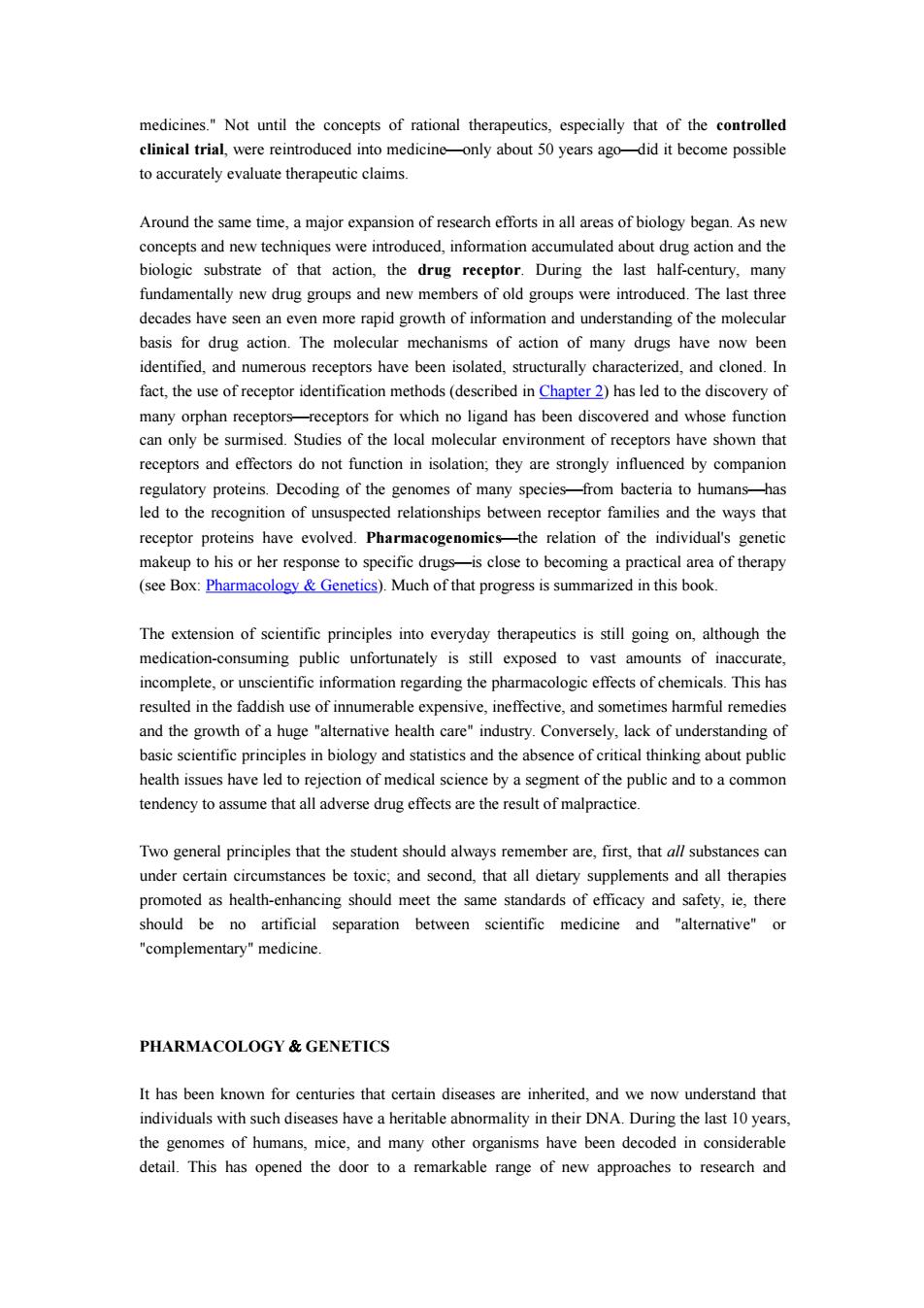正在加载图片...

medicines."Not until the concepts of rational therapeutics,especially that of the controlled clinical trial,were reintroduced into medicine-only about 50 years ago-did it become possible to accurately evaluate therapeutic claims. Around the same time,a major expansion of research efforts in all areas of biology began.As new concepts and new techniques were introduced,information accumulated about drug action and the biologic substrate of that action,the drug receptor.During the last half-century,many fundamentally new drug groups and new members of old groups were introduced.The last three decades have seen an even more rapid growth of information and understanding of the molecular basis for drug action.The molecular mechanisms of action of many drugs have now been identified,and numerous receptors have been isolated,structurally characterized,and cloned.In fact,the use of receptor identification methods(described in Chapter 2)has led to the discovery of many orphan receptors-receptors for which no ligand has been discovered and whose function can only be surmised.Studies of the local molecular environment of receptors have shown that receptors and effectors do not function in isolation;they are strongly influenced by companion regulatory proteins.Decoding of the genomes of many species-from bacteria to humans-has led to the recognition of unsuspected relationships between receptor families and the ways that receptor proteins have evolved.Pharmacogenomics-the relation of the individual's genetic makeup to his or her response to specific drugs-is close to becoming a practical area of therapy (see Box:Pharmacology Genetics).Much of that progress is summarized in this book. The extension of scientific principles into everyday therapeutics is still going on,although the medication-consuming public unfortunately is still exposed to vast amounts of inaccurate, incomplete,or unscientific information regarding the pharmacologic effects of chemicals.This has resulted in the faddish use of innumerable expensive,ineffective,and sometimes harmful remedies and the growth of a huge "alternative health care"industry.Conversely.lack of understanding of basic scientific principles in biology and statistics and the absence of critical thinking about public health issues have led to rejection of medical science by a segment of the public and to a common tendency to assume that all adverse drug effects are the result of malpractice. Two general principles that the student should always remember are,first,that all substances can under certain circumstances be toxic;and second,that all dietary supplements and all therapies promoted as health-enhancing should meet the same standards of efficacy and safety,ie,there should be no artificial separation between scientific medicine and "alternative"or "complementary"medicine. PHARMACOLOGY GENETICS It has been known for centuries that certain diseases are inherited,and we now understand that individuals with such diseases have a heritable abnormality in their DNA.During the last 10 years, the genomes of humans,mice,and many other organisms have been decoded in considerable detail.This has opened the door to a remarkable range of new approaches to research andmedicines." Not until the concepts of rational therapeutics, especially that of the controlled clinical trial, were reintroduced into medicineonly about 50 years agodid it become possible to accurately evaluate therapeutic claims. Around the same time, a major expansion of research efforts in all areas of biology began. As new concepts and new techniques were introduced, information accumulated about drug action and the biologic substrate of that action, the drug receptor. During the last half-century, many fundamentally new drug groups and new members of old groups were introduced. The last three decades have seen an even more rapid growth of information and understanding of the molecular basis for drug action. The molecular mechanisms of action of many drugs have now been identified, and numerous receptors have been isolated, structurally characterized, and cloned. In fact, the use of receptor identification methods (described in Chapter 2) has led to the discovery of many orphan receptorsreceptors for which no ligand has been discovered and whose function can only be surmised. Studies of the local molecular environment of receptors have shown that receptors and effectors do not function in isolation; they are strongly influenced by companion regulatory proteins. Decoding of the genomes of many speciesfrom bacteria to humanshas led to the recognition of unsuspected relationships between receptor families and the ways that receptor proteins have evolved. Pharmacogenomicsthe relation of the individual's genetic makeup to his or her response to specific drugsis close to becoming a practical area of therapy (see Box: Pharmacology & Genetics). Much of that progress is summarized in this book. The extension of scientific principles into everyday therapeutics is still going on, although the medication-consuming public unfortunately is still exposed to vast amounts of inaccurate, incomplete, or unscientific information regarding the pharmacologic effects of chemicals. This has resulted in the faddish use of innumerable expensive, ineffective, and sometimes harmful remedies and the growth of a huge "alternative health care" industry. Conversely, lack of understanding of basic scientific principles in biology and statistics and the absence of critical thinking about public health issues have led to rejection of medical science by a segment of the public and to a common tendency to assume that all adverse drug effects are the result of malpractice. Two general principles that the student should always remember are, first, that all substances can under certain circumstances be toxic; and second, that all dietary supplements and all therapies promoted as health-enhancing should meet the same standards of efficacy and safety, ie, there should be no artificial separation between scientific medicine and "alternative" or "complementary" medicine. PHARMACOLOGY GENETICS It has been known for centuries that certain diseases are inherited, and we now understand that individuals with such diseases have a heritable abnormality in their DNA. During the last 10 years, the genomes of humans, mice, and many other organisms have been decoded in considerable detail. This has opened the door to a remarkable range of new approaches to research and